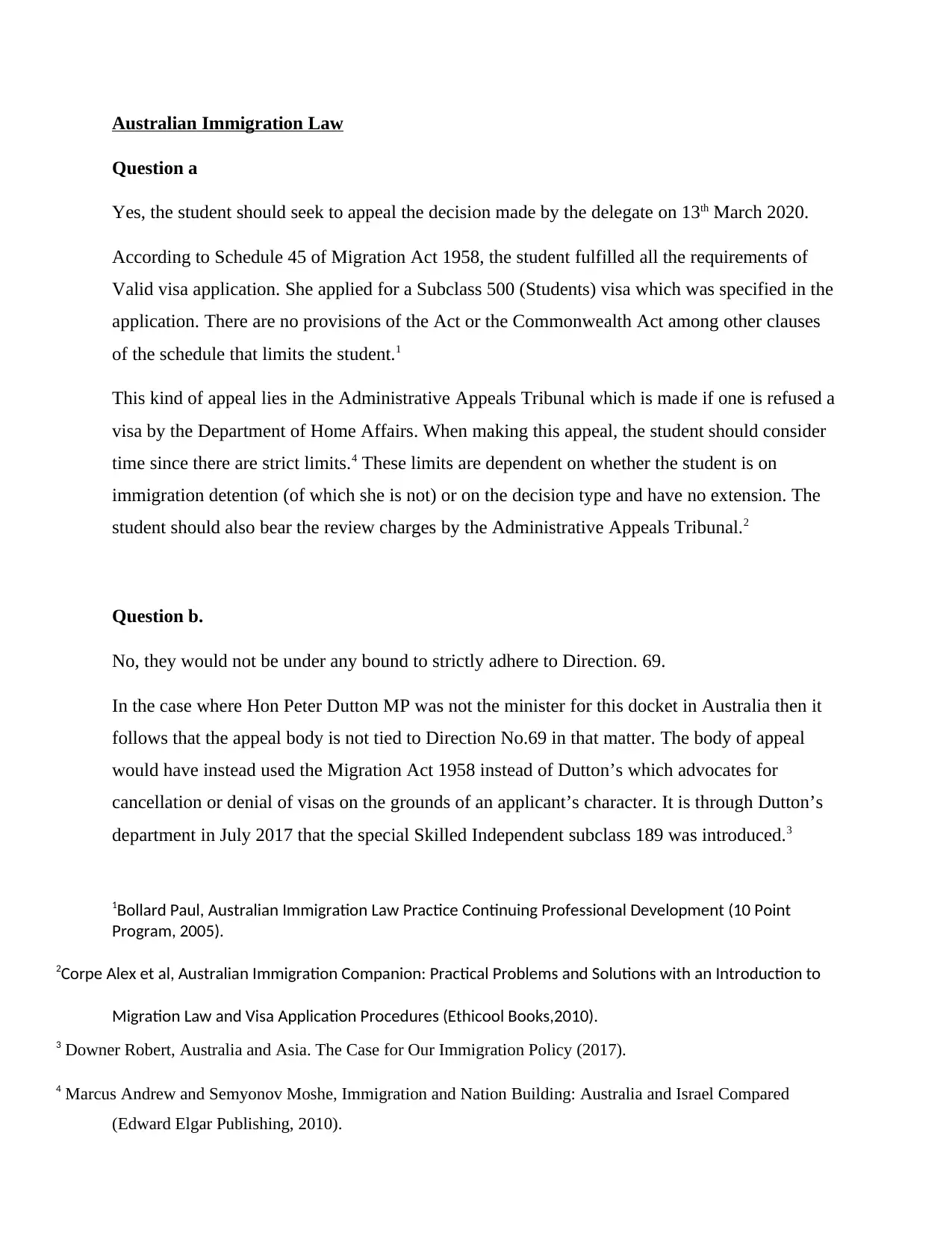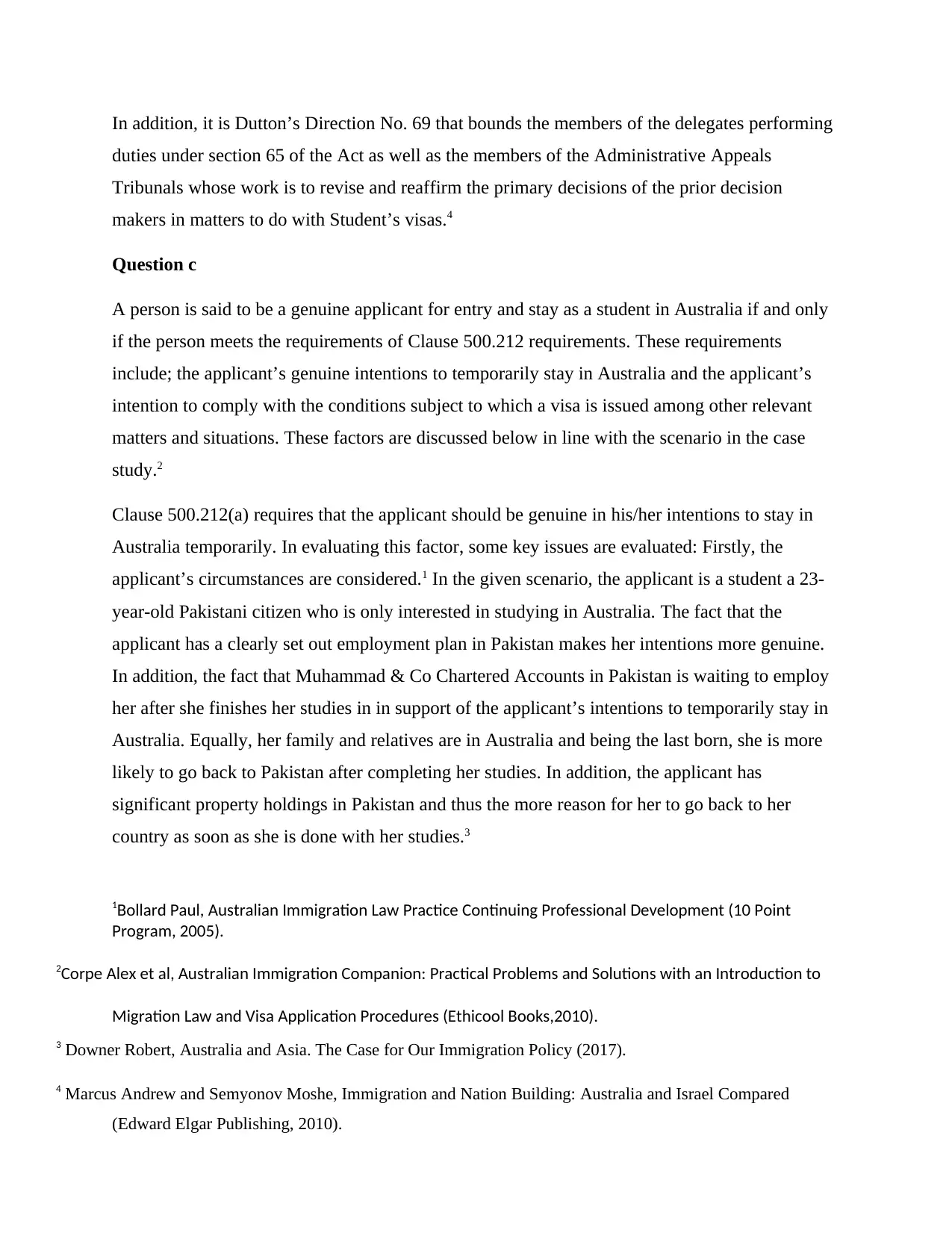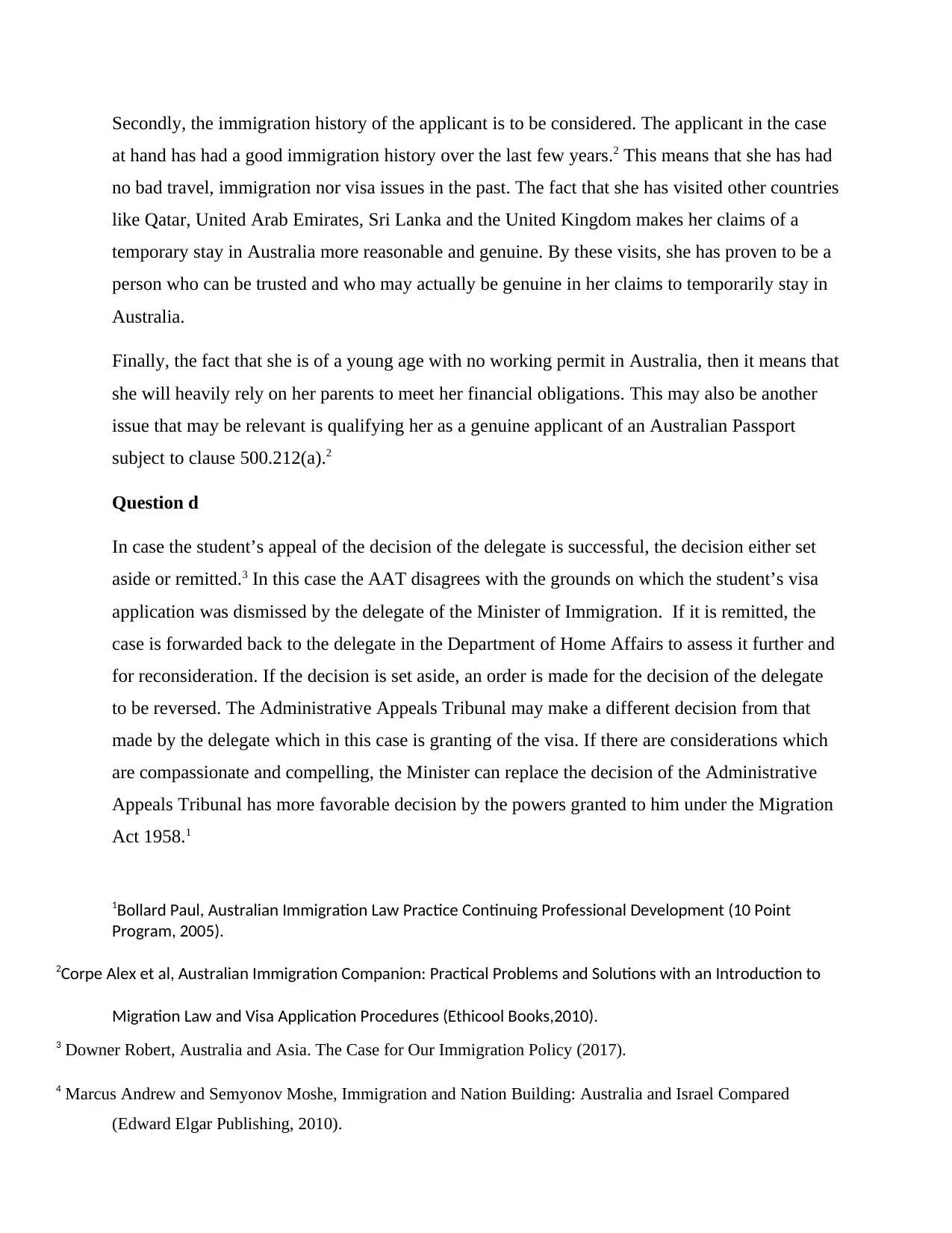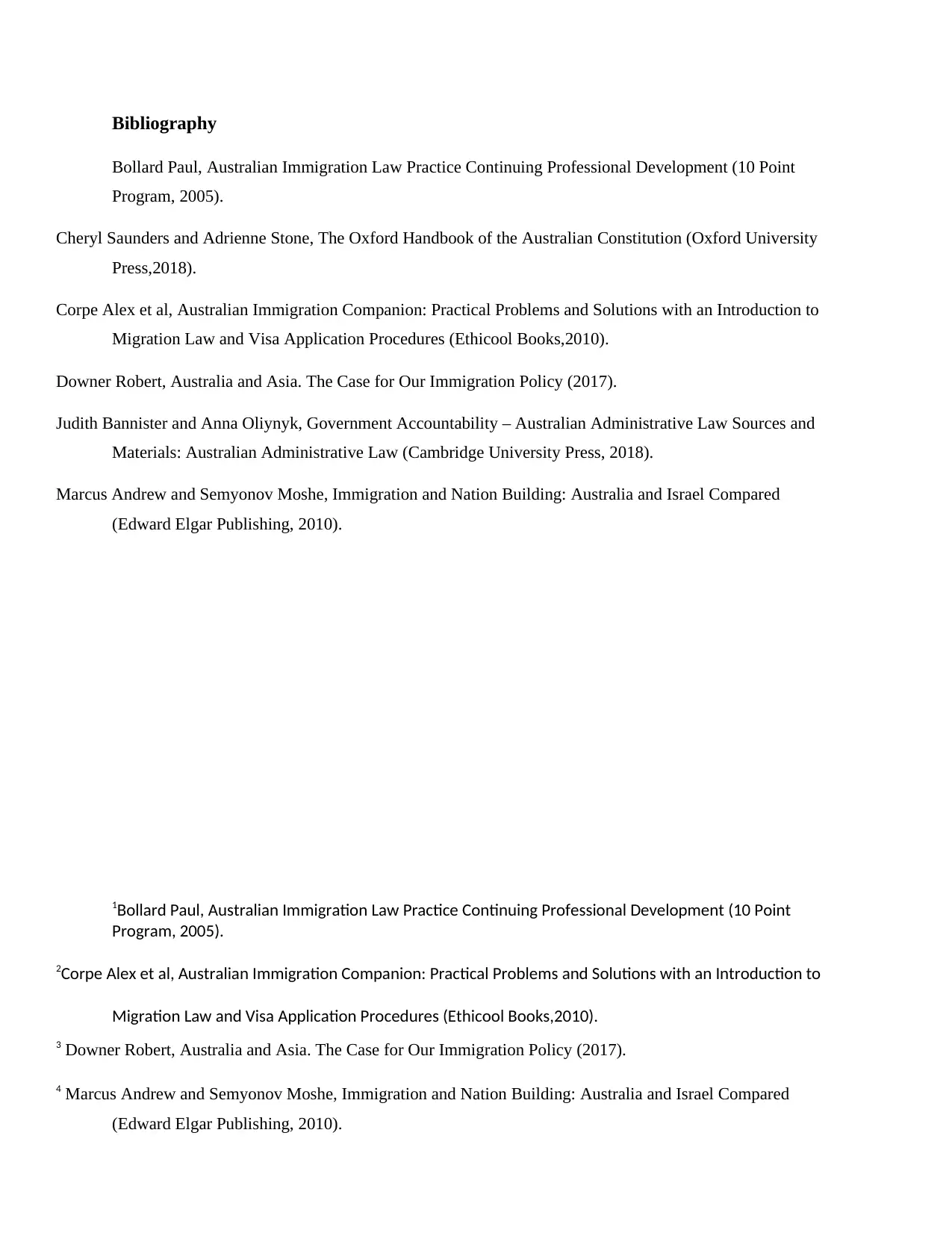Case Study: Student Visa Application and Appeal in Australia
VerifiedAdded on 2022/09/01
|4
|1167
|16
Case Study
AI Summary
This assignment analyzes a case study concerning an Australian immigration law matter. A 23-year-old Pakistani student's Subclass 500 (Student) visa application was refused by a delegate of the Minister for Immigration. The refusal was based on the applicant not meeting the requirements of clause 500.212(a), specifically that she was not considered a genuine applicant. The assignment examines whether the student should appeal the decision, considering the requirements of the Migration Act 1958 and the Administrative Appeals Tribunal (AAT). It also explores the relevance of Direction No. 69, the definition of a genuine applicant under clause 500.212, and the potential outcomes if the appeal is successful, including the possibility of the decision being set aside or remitted. The analysis considers the applicant's circumstances, immigration history, and intentions to stay in Australia. The document concludes with a bibliography of relevant legal resources.

Australian Immigration Law
Question a
Yes, the student should seek to appeal the decision made by the delegate on 13th March 2020.
According to Schedule 45 of Migration Act 1958, the student fulfilled all the requirements of
Valid visa application. She applied for a Subclass 500 (Students) visa which was specified in the
application. There are no provisions of the Act or the Commonwealth Act among other clauses
of the schedule that limits the student.1
This kind of appeal lies in the Administrative Appeals Tribunal which is made if one is refused a
visa by the Department of Home Affairs. When making this appeal, the student should consider
time since there are strict limits.4 These limits are dependent on whether the student is on
immigration detention (of which she is not) or on the decision type and have no extension. The
student should also bear the review charges by the Administrative Appeals Tribunal.2
Question b.
No, they would not be under any bound to strictly adhere to Direction. 69.
In the case where Hon Peter Dutton MP was not the minister for this docket in Australia then it
follows that the appeal body is not tied to Direction No.69 in that matter. The body of appeal
would have instead used the Migration Act 1958 instead of Dutton’s which advocates for
cancellation or denial of visas on the grounds of an applicant’s character. It is through Dutton’s
department in July 2017 that the special Skilled Independent subclass 189 was introduced.3
1Bollard Paul, Australian Immigration Law Practice Continuing Professional Development (10 Point
Program, 2005).
2Corpe Alex et al, Australian Immigration Companion: Practical Problems and Solutions with an Introduction to
Migration Law and Visa Application Procedures (Ethicool Books,2010).
3 Downer Robert, Australia and Asia. The Case for Our Immigration Policy (2017).
4 Marcus Andrew and Semyonov Moshe, Immigration and Nation Building: Australia and Israel Compared
(Edward Elgar Publishing, 2010).
Question a
Yes, the student should seek to appeal the decision made by the delegate on 13th March 2020.
According to Schedule 45 of Migration Act 1958, the student fulfilled all the requirements of
Valid visa application. She applied for a Subclass 500 (Students) visa which was specified in the
application. There are no provisions of the Act or the Commonwealth Act among other clauses
of the schedule that limits the student.1
This kind of appeal lies in the Administrative Appeals Tribunal which is made if one is refused a
visa by the Department of Home Affairs. When making this appeal, the student should consider
time since there are strict limits.4 These limits are dependent on whether the student is on
immigration detention (of which she is not) or on the decision type and have no extension. The
student should also bear the review charges by the Administrative Appeals Tribunal.2
Question b.
No, they would not be under any bound to strictly adhere to Direction. 69.
In the case where Hon Peter Dutton MP was not the minister for this docket in Australia then it
follows that the appeal body is not tied to Direction No.69 in that matter. The body of appeal
would have instead used the Migration Act 1958 instead of Dutton’s which advocates for
cancellation or denial of visas on the grounds of an applicant’s character. It is through Dutton’s
department in July 2017 that the special Skilled Independent subclass 189 was introduced.3
1Bollard Paul, Australian Immigration Law Practice Continuing Professional Development (10 Point
Program, 2005).
2Corpe Alex et al, Australian Immigration Companion: Practical Problems and Solutions with an Introduction to
Migration Law and Visa Application Procedures (Ethicool Books,2010).
3 Downer Robert, Australia and Asia. The Case for Our Immigration Policy (2017).
4 Marcus Andrew and Semyonov Moshe, Immigration and Nation Building: Australia and Israel Compared
(Edward Elgar Publishing, 2010).
Paraphrase This Document
Need a fresh take? Get an instant paraphrase of this document with our AI Paraphraser

In addition, it is Dutton’s Direction No. 69 that bounds the members of the delegates performing
duties under section 65 of the Act as well as the members of the Administrative Appeals
Tribunals whose work is to revise and reaffirm the primary decisions of the prior decision
makers in matters to do with Student’s visas.4
Question c
A person is said to be a genuine applicant for entry and stay as a student in Australia if and only
if the person meets the requirements of Clause 500.212 requirements. These requirements
include; the applicant’s genuine intentions to temporarily stay in Australia and the applicant’s
intention to comply with the conditions subject to which a visa is issued among other relevant
matters and situations. These factors are discussed below in line with the scenario in the case
study.2
Clause 500.212(a) requires that the applicant should be genuine in his/her intentions to stay in
Australia temporarily. In evaluating this factor, some key issues are evaluated: Firstly, the
applicant’s circumstances are considered.1 In the given scenario, the applicant is a student a 23-
year-old Pakistani citizen who is only interested in studying in Australia. The fact that the
applicant has a clearly set out employment plan in Pakistan makes her intentions more genuine.
In addition, the fact that Muhammad & Co Chartered Accounts in Pakistan is waiting to employ
her after she finishes her studies in in support of the applicant’s intentions to temporarily stay in
Australia. Equally, her family and relatives are in Australia and being the last born, she is more
likely to go back to Pakistan after completing her studies. In addition, the applicant has
significant property holdings in Pakistan and thus the more reason for her to go back to her
country as soon as she is done with her studies.3
1Bollard Paul, Australian Immigration Law Practice Continuing Professional Development (10 Point
Program, 2005).
2Corpe Alex et al, Australian Immigration Companion: Practical Problems and Solutions with an Introduction to
Migration Law and Visa Application Procedures (Ethicool Books,2010).
3 Downer Robert, Australia and Asia. The Case for Our Immigration Policy (2017).
4 Marcus Andrew and Semyonov Moshe, Immigration and Nation Building: Australia and Israel Compared
(Edward Elgar Publishing, 2010).
duties under section 65 of the Act as well as the members of the Administrative Appeals
Tribunals whose work is to revise and reaffirm the primary decisions of the prior decision
makers in matters to do with Student’s visas.4
Question c
A person is said to be a genuine applicant for entry and stay as a student in Australia if and only
if the person meets the requirements of Clause 500.212 requirements. These requirements
include; the applicant’s genuine intentions to temporarily stay in Australia and the applicant’s
intention to comply with the conditions subject to which a visa is issued among other relevant
matters and situations. These factors are discussed below in line with the scenario in the case
study.2
Clause 500.212(a) requires that the applicant should be genuine in his/her intentions to stay in
Australia temporarily. In evaluating this factor, some key issues are evaluated: Firstly, the
applicant’s circumstances are considered.1 In the given scenario, the applicant is a student a 23-
year-old Pakistani citizen who is only interested in studying in Australia. The fact that the
applicant has a clearly set out employment plan in Pakistan makes her intentions more genuine.
In addition, the fact that Muhammad & Co Chartered Accounts in Pakistan is waiting to employ
her after she finishes her studies in in support of the applicant’s intentions to temporarily stay in
Australia. Equally, her family and relatives are in Australia and being the last born, she is more
likely to go back to Pakistan after completing her studies. In addition, the applicant has
significant property holdings in Pakistan and thus the more reason for her to go back to her
country as soon as she is done with her studies.3
1Bollard Paul, Australian Immigration Law Practice Continuing Professional Development (10 Point
Program, 2005).
2Corpe Alex et al, Australian Immigration Companion: Practical Problems and Solutions with an Introduction to
Migration Law and Visa Application Procedures (Ethicool Books,2010).
3 Downer Robert, Australia and Asia. The Case for Our Immigration Policy (2017).
4 Marcus Andrew and Semyonov Moshe, Immigration and Nation Building: Australia and Israel Compared
(Edward Elgar Publishing, 2010).

Secondly, the immigration history of the applicant is to be considered. The applicant in the case
at hand has had a good immigration history over the last few years.2 This means that she has had
no bad travel, immigration nor visa issues in the past. The fact that she has visited other countries
like Qatar, United Arab Emirates, Sri Lanka and the United Kingdom makes her claims of a
temporary stay in Australia more reasonable and genuine. By these visits, she has proven to be a
person who can be trusted and who may actually be genuine in her claims to temporarily stay in
Australia.
Finally, the fact that she is of a young age with no working permit in Australia, then it means that
she will heavily rely on her parents to meet her financial obligations. This may also be another
issue that may be relevant is qualifying her as a genuine applicant of an Australian Passport
subject to clause 500.212(a).2
Question d
In case the student’s appeal of the decision of the delegate is successful, the decision either set
aside or remitted.3 In this case the AAT disagrees with the grounds on which the student’s visa
application was dismissed by the delegate of the Minister of Immigration. If it is remitted, the
case is forwarded back to the delegate in the Department of Home Affairs to assess it further and
for reconsideration. If the decision is set aside, an order is made for the decision of the delegate
to be reversed. The Administrative Appeals Tribunal may make a different decision from that
made by the delegate which in this case is granting of the visa. If there are considerations which
are compassionate and compelling, the Minister can replace the decision of the Administrative
Appeals Tribunal has more favorable decision by the powers granted to him under the Migration
Act 1958.1
1Bollard Paul, Australian Immigration Law Practice Continuing Professional Development (10 Point
Program, 2005).
2Corpe Alex et al, Australian Immigration Companion: Practical Problems and Solutions with an Introduction to
Migration Law and Visa Application Procedures (Ethicool Books,2010).
3 Downer Robert, Australia and Asia. The Case for Our Immigration Policy (2017).
4 Marcus Andrew and Semyonov Moshe, Immigration and Nation Building: Australia and Israel Compared
(Edward Elgar Publishing, 2010).
at hand has had a good immigration history over the last few years.2 This means that she has had
no bad travel, immigration nor visa issues in the past. The fact that she has visited other countries
like Qatar, United Arab Emirates, Sri Lanka and the United Kingdom makes her claims of a
temporary stay in Australia more reasonable and genuine. By these visits, she has proven to be a
person who can be trusted and who may actually be genuine in her claims to temporarily stay in
Australia.
Finally, the fact that she is of a young age with no working permit in Australia, then it means that
she will heavily rely on her parents to meet her financial obligations. This may also be another
issue that may be relevant is qualifying her as a genuine applicant of an Australian Passport
subject to clause 500.212(a).2
Question d
In case the student’s appeal of the decision of the delegate is successful, the decision either set
aside or remitted.3 In this case the AAT disagrees with the grounds on which the student’s visa
application was dismissed by the delegate of the Minister of Immigration. If it is remitted, the
case is forwarded back to the delegate in the Department of Home Affairs to assess it further and
for reconsideration. If the decision is set aside, an order is made for the decision of the delegate
to be reversed. The Administrative Appeals Tribunal may make a different decision from that
made by the delegate which in this case is granting of the visa. If there are considerations which
are compassionate and compelling, the Minister can replace the decision of the Administrative
Appeals Tribunal has more favorable decision by the powers granted to him under the Migration
Act 1958.1
1Bollard Paul, Australian Immigration Law Practice Continuing Professional Development (10 Point
Program, 2005).
2Corpe Alex et al, Australian Immigration Companion: Practical Problems and Solutions with an Introduction to
Migration Law and Visa Application Procedures (Ethicool Books,2010).
3 Downer Robert, Australia and Asia. The Case for Our Immigration Policy (2017).
4 Marcus Andrew and Semyonov Moshe, Immigration and Nation Building: Australia and Israel Compared
(Edward Elgar Publishing, 2010).
⊘ This is a preview!⊘
Do you want full access?
Subscribe today to unlock all pages.

Trusted by 1+ million students worldwide

Bibliography
Bollard Paul, Australian Immigration Law Practice Continuing Professional Development (10 Point
Program, 2005).
Cheryl Saunders and Adrienne Stone, The Oxford Handbook of the Australian Constitution (Oxford University
Press,2018).
Corpe Alex et al, Australian Immigration Companion: Practical Problems and Solutions with an Introduction to
Migration Law and Visa Application Procedures (Ethicool Books,2010).
Downer Robert, Australia and Asia. The Case for Our Immigration Policy (2017).
Judith Bannister and Anna Oliynyk, Government Accountability – Australian Administrative Law Sources and
Materials: Australian Administrative Law (Cambridge University Press, 2018).
Marcus Andrew and Semyonov Moshe, Immigration and Nation Building: Australia and Israel Compared
(Edward Elgar Publishing, 2010).
1Bollard Paul, Australian Immigration Law Practice Continuing Professional Development (10 Point
Program, 2005).
2Corpe Alex et al, Australian Immigration Companion: Practical Problems and Solutions with an Introduction to
Migration Law and Visa Application Procedures (Ethicool Books,2010).
3 Downer Robert, Australia and Asia. The Case for Our Immigration Policy (2017).
4 Marcus Andrew and Semyonov Moshe, Immigration and Nation Building: Australia and Israel Compared
(Edward Elgar Publishing, 2010).
Bollard Paul, Australian Immigration Law Practice Continuing Professional Development (10 Point
Program, 2005).
Cheryl Saunders and Adrienne Stone, The Oxford Handbook of the Australian Constitution (Oxford University
Press,2018).
Corpe Alex et al, Australian Immigration Companion: Practical Problems and Solutions with an Introduction to
Migration Law and Visa Application Procedures (Ethicool Books,2010).
Downer Robert, Australia and Asia. The Case for Our Immigration Policy (2017).
Judith Bannister and Anna Oliynyk, Government Accountability – Australian Administrative Law Sources and
Materials: Australian Administrative Law (Cambridge University Press, 2018).
Marcus Andrew and Semyonov Moshe, Immigration and Nation Building: Australia and Israel Compared
(Edward Elgar Publishing, 2010).
1Bollard Paul, Australian Immigration Law Practice Continuing Professional Development (10 Point
Program, 2005).
2Corpe Alex et al, Australian Immigration Companion: Practical Problems and Solutions with an Introduction to
Migration Law and Visa Application Procedures (Ethicool Books,2010).
3 Downer Robert, Australia and Asia. The Case for Our Immigration Policy (2017).
4 Marcus Andrew and Semyonov Moshe, Immigration and Nation Building: Australia and Israel Compared
(Edward Elgar Publishing, 2010).
1 out of 4
Related Documents
Your All-in-One AI-Powered Toolkit for Academic Success.
+13062052269
info@desklib.com
Available 24*7 on WhatsApp / Email
![[object Object]](/_next/static/media/star-bottom.7253800d.svg)
Unlock your academic potential
Copyright © 2020–2025 A2Z Services. All Rights Reserved. Developed and managed by ZUCOL.





